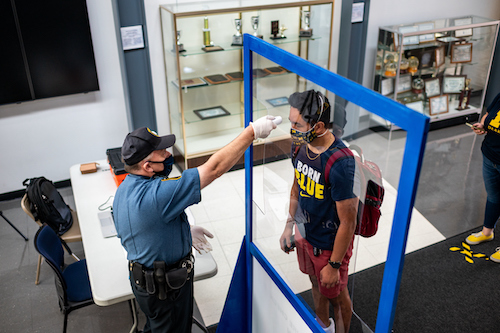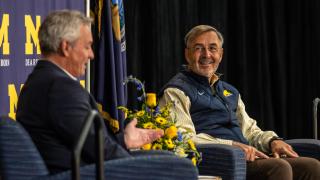
When UM-Dearborn leadership decided to take a remote-first approach to instruction to help control the pandemic on and off-campus, Faculty Senate Chair Natalia Czap says there was understandably disappointment among some faculty. “I think, at first, there were definitely people who thought we were being too cautious,” Czap says. “As faculty, we really love teaching and love having our students in the classroom. And I think some faculty were concerned about the impact that would have on students and their desire for in-person instruction and interaction.”
Now 10 months into the pandemic, however, Czap says there is wide consensus that the clear, aggressive, science-informed response to the pandemic was the right one. Most importantly, new cases in the UM-Dearborn community have remained extremely low, even as cases have surged across Michigan and the country as a whole. And Czap points out the early decision also gave faculty and students time to make adjustments to their academic and personal lives. In particular, she says faculty have felt extremely supported by the non-stop effort of instructional designers at The Hub; and by the Provost’s office, which has taken extra steps to address increased workloads and family care demands through the Care and Equity Task Force.
In recognition of this, the Faculty Senate recently unanimously passed a motion commending Chancellor Domenico Grasso, Provost Sue Alcock and the rest of the leadership team for “their efforts to assure the safety and security of our campus community during this time of the COVID-19 pandemic.” Czap added that “everyone should be proud that our campus’ sacrifices ensured that Wayne and the surrounding counties had fewer coronavirus cases than we would have probably seen otherwise.”
Grasso says it’s “generous and kind” of the faculty to acknowledge senior leadership but that UM-Dearborn’s COVID-19 response has been a real team effort. “To the faculty, I would say: Right back at you. No matter what the leadership did, if the faculty and staff were not a part of the team joining us, this could have gone in a very different direction. So they should be equally commended for their efforts.”
Grasso attributes the success of the university’s response thus far to several factors. He says Director for Emergency Management Laura Drabczyk’s contributions on the Emergency Operations Center team, and the entire team’s efforts, have been pivotal; as have Provost Alcock’s efforts to help faculty transition to a mostly remote learning environment. In addition, clear, frequent communications from leadership helped keep everyone in the UM-Dearborn community on the same page during a quickly evolving situation.
Grasso says it’s also important to recognize that UM-Dearborn was “dealt a very good hand” compared to other colleges and universities, many of which are now struggling with higher case counts.
“We are extraordinarily fortunate to be a 100 percent commuter campus, and to not have residence halls, large dining facilities, or a large medical center,” Grasso says. “But we’ve played that good hand well, and I think we can all be proud of that."





